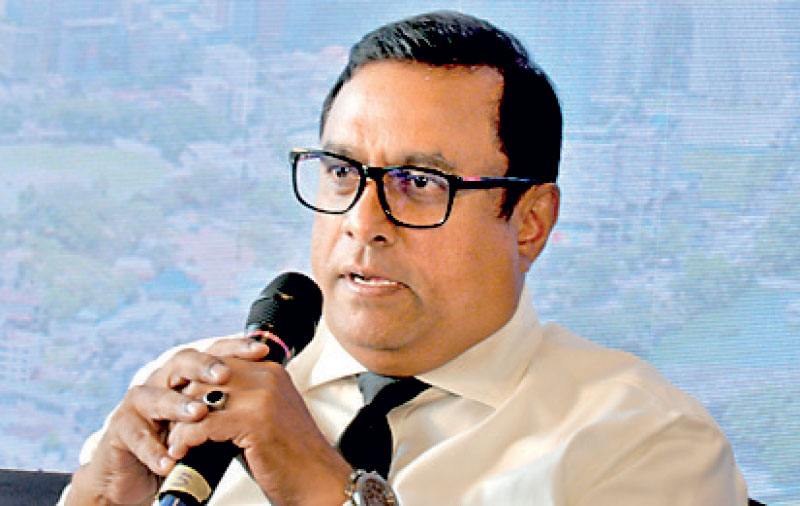Saturday Feb 21, 2026
Saturday Feb 21, 2026
Thursday, 6 November 2025 06:14 - - {{hitsCtrl.values.hits}}

National Procurement Commission Member Dr. Asanga Gunawansa – Pic by Lasantha Kumara
By Charumini de Silva
Top legal expert and National Procurement Commission (NPC) Member Dr. Asanga Gunawansa on Tuesday cautioned that Sri Lanka risks creating a maze of overlapping regulatory authorities and legal inconsistencies in its approach to public-private partnerships (PPPs) and procurement, unless urgent steps are taken to align and streamline its institutional framework.
Speaking at a high-level forum in Colombo titled “PPP: Partnership and Prosperity for People” organised by the High Commission of India, in collaboration with The Ceylon Chamber of Commerce (CCC), Dr. Gunawansa described the current phase as the “reincarnation” of the NPC, first introduced through the 19th Amendment, abolished under the 20th, and revived through the 21st Amendment.
The functions and powers of the National Procurement Commission are clearly set out under Articles 156C and 156D of the 21st Amendment to the Constitution.
He noted that this marks a significant shift from earlier practices, where procurement guidelines were issued by the National Procurement Agency functioning under the Ministry of Finance, without the force of law.
“Those guidelines did not have the teeth of legislation,” he explained, adding that despite judicial pronouncements by the Court of Appeal and Supreme Court giving them the effect of law, they lacked formal constitutional authority.
“Now, under the 21st Amendment, procurement guidelines are given a Constitutional mandate. Although they are called guidelines, they are effectively law,” he observed.
However, Dr. Gunawansa raised a crucial question whether the NPC’s purview extends to PPPs. “PPPs, by definition, involve private investment in public projects. While there is a procurement aspect in selecting a private partner, it remains unclear whether PPPs fall squarely within the Commission’s mandate,” he said.
The National Procurement Guidelines, introduced in December 2024 and effective from 1 January 2025, include a definition of PPPs, but he pointed out that their coverage is limited because PPPs traditionally fall under the purview of the National Agency for Public Private Partnerships (NAPPP).
Complicating matters further, Dr. Gunawansa noted that Sri Lanka recently enacted the Public Finance Management (PFM) Act, which contains specific sections (40–45) dealing with PPPs. The Act assigns the oversight of PPPs to the Ministry of Finance and empowers it to issue regulations and establish a Public Investment Committee (PIC) as a supervisory body; though, he said, it has not yet been set up.
“This new law also stipulates that in the event of any conflict between the PFM Act and another law on the same subject, the PFM Act will supersede,” he warned.
According to him, the forthcoming PPP Act, meanwhile, assigns similar supervisory and regulatory powers to the NAPPP. When combined with the NPC’s constitutional powers under the 21st Amendment and the Finance Ministry’s authority under the PFM Act, Sri Lanka now faces what Dr. Gunawansa described as “four parallel entities with overlapping powers.”
“The Ministry of Finance, the Public Investment Committee, the National Agency for Public Private Partnerships and the National Procurement Commission — all have mandates that touch upon PPPs and procurement. If each of these entities begins issuing its own guidelines, we will end up with a ‘fruit salad situation’ where no investor will be able to clearly understand Sri Lanka’s PPP architecture,” he cautioned.
He stressed that while the PPP Act is still at the drafting stage, this is the critical moment to align mandates and clarify responsibilities.
“We must sit down with all relevant stakeholders, including the National Procurement Commission, and iron out these issues before the law is enacted. Otherwise, once the law comes into effect, the confusion will multiply,” he warned.
Dr. Gunawansa also pointed out that relying on judicial review is not a practical solution to fix legislative inconsistencies.
“Some may say these issues can be challenged in the Supreme Court. But the Court’s attention is usually drawn to specific sections on human rights or sustainable development — not on the economic or institutional implications. So, it is the responsibility of the drafters to identify and resolve these overlaps before enactment,” he emphasised.
Another area of concern he raised was the accuracy of legislative translations. Noting that most laws are drafted in English, he said that those then get translated into Sinhala and Tamil. However, the Constitution stipulates that in the event of inconsistency between the three languages, the Sinhala text will prevail.
“This means the translation, not the original English draft, becomes the law. Therefore, it is critical that the Sinhala version be reviewed meticulously by those who prepared the original English draft, especially the legal consultants, to ensure that the original intent of the law is not lost or misrepresented,” he explained.
Dr. Gunawansa urged policymakers to adopt a cautious and coordinated approach when framing Sri Lanka’s PPP and procurement laws.
“We must put our house in order first. Without clarity, consistency and legal precision, we risk deterring the very investors we seek to attract,” he opined.